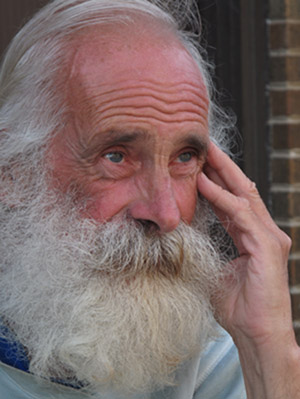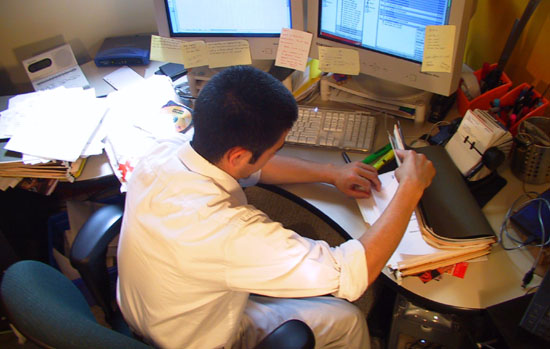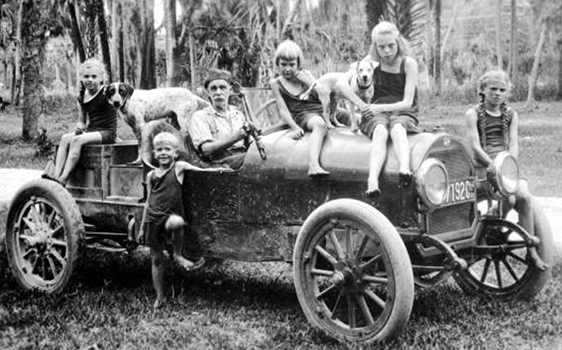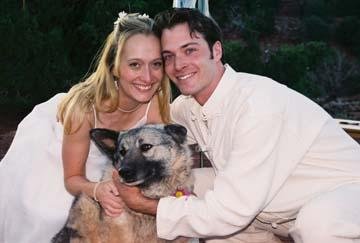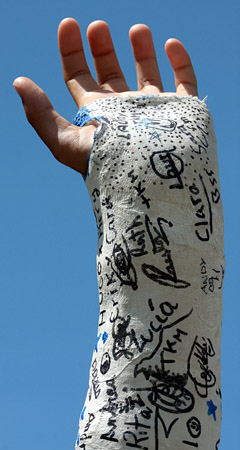 The other day I did one of my favorite things in the world: I took a nap!
The other day I did one of my favorite things in the world: I took a nap!
The nap itself was glorious (as naps tend to be), but when I woke up there was something wrong: my left arm was numb and paralyzed.
(I’m reminded of the old Stephen Wright joke: I hate it when my foot falls asleep during the day because that means it’s going to be up all night.)
I picked up the “sleeping” arm with my other hand and let it drop, but I couldn’t feel a thing–and couldn’t move it on its own. It was like having an inanimate object attached to my body.
If you’ve ever had an arm (or a foot or any other body part) fall asleep, you know that it’s a very odd sensation–or, rather, no sensation at all. It can be very disconcerting, and I probably would’ve called 911 in a panic (dialing with my other hand, of course) if I didn’t know from experience that the numbness/paralysis would be short-lived.
And, sure enough, within a few minutes the arm started waking up: starting with subtle tingles, which turned into needles, which, for awhile, became so painful that I almost wished my arm would go back to sleep.
A few minutes later, however, the pain subsided, and my arm was back to normal.
Aaahhhhh….. 🙂
Although this very commonplace experience lasted only a few minutes, it got me thinking about numbness, pain, and the idea of “coming back to life.” (Granted, this idea has been on my mind a lot lately, since my wife just launched an ecourse with that title–which I’ll be shamelessly plugging for the next few months!) What I realized was this:
Oftentimes, pain is the first sign that we’re waking up and coming back to life.
Although no one likes to feel pain, at least it’s a sign that we’re not totally numb–not asleep or unfeeling (or dead). The feeling may not be pleasant, but at least we’re feeling something!
And that’s often what happens in our lives as we become more conscious, more aware, more sensitive: We start feeling more things–including some feelings that we don’t necessarily enjoy. We might experience pain. And we might even wish that we could go back to sleep, go back to being numb, go back to feeling nothing at all rather than this agonizing, unbearable pain.
And it makes sense. I get it. I can sympathize.
I’ve felt pain–far worse than a tingling arm. We all have. And we’ve all had moments when we’ve wished that the pain would just go away–even if it meant feeling nothing at all. When we’re in pain, it’s completely natural that part of us would rather numb out than feel the pain–or feel anything.
But there’s another part of us that, even in the midst of great pain, realizes three important things:
- This too shall pass. Even the worst pain subsides over time.
- Pain can be a teacher. Whether it’s teaching us a lesson about impermanence or reminding us not to touch a hot stove, pain is ultimately there to serve us.
- Pain is a sign of life. Whether you’re experiencing hypothermia or heartbreak, you should be most worried when you stop feeling!
I’m not suggesting that we intentionally seek out pain or eagerly invite it into our lives, I’m merely saying that when it does (inevitably) show up, we can see it as evidence that we are awake and alive and able to feel.
And that means that we are also able to feel the rest of the spectrum of sensations and emotions–including joy, ecstasy, elation, relief, awe, and love.
And we remember why it’s all worth it.
At some point, you too will take a nap.
Part of you will fall asleep–your arm or your foot, or maybe your heart or your soul. But eventually you will wake up. You will feel the tingles and, most likely, some pain. And that’s when you have a choice. You can either curse the pain or see it for what it is:
A sign of life.
…
If you enjoyed this post, please feel free to comment and/or share it with anyone else you think might find it of interest. Thanks!




